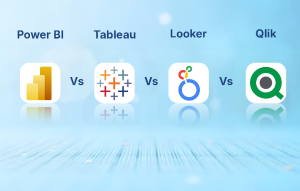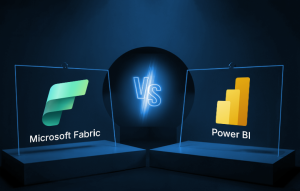From the roar of the crowd to split-second decisions on the field, the world of sports has always thrived on passion, competition, and strategy. To make the gaming experience even better, new forces are entering the playing field: artificial intelligence (AI) and its powerful partner, data analytics. This dynamic duo is transforming the sports industry, unlocking deeper insights, optimizing performance, and shaping the future of the game.
AI segment in the sports industry will reach a value of 19.2 billion dollars by 2030. – Allied Market Research
This blog post provides a summary of how artificial intelligence is currently being used in the sports sector, along with a few examples showing AI technology being put into practice.
Use cases of analytics and AI in sports
Live game analysis
AI-powered computer vision technology can track the real-time movement and positions of players, the ball, and other objects during a live game. Data analytics can analyze spatial data, formations, trajectories, and decision patterns. Coaching staff use these AI-generated insights to predict future actions, suggest counter tactics, flag fatigue or injuries, and more. This augmented human analysis can dramatically improve the quality of in-game adjustments.
Training and practice
Wearable sensors and computer vision systems collect biomarkers like acceleration, heart rate, speed, and conditioning levels alongside video feeds during practices, drills, and training regimes. The biometrics and visual feedback are processed by machine learning algorithms to detect minute technique deficiencies in athletes’ movements.
Coaches can leverage data analytics to provide highly precise, customized feedback that spurs skill development. Predictive modeling based on training data also optimizes future sessions for each athlete to boost progress.
For example: By tapping Power BI’s advanced analytics, the coaching staff can pinpoint impending player injuries from analysis of biometrics, medical history and workload data. Adapting training weeks ahead allows optimized, preemptive load management. The predictive insights markedly decrease injuries and sustain full-strength team excellence.
Game tactics and strategies
Sophisticated machine learning algorithms ingest data about players’ attributes, opposing teams’ styles, environmental context and more to run hyper-realistic simulations of upcoming matches/games millions of times. This produces the highest probability strategies, play calls, roster decisions, substitution patterns and other situational tactics to optimize success. Teams can leverage these AI playbooks to stress test plans against different scenarios.
Injury prevention
Analyze data from wearables, medical tests and athlete self-reports to accurately model injury likelihood for individuals based on training loads across strength, speed, conditioning, etc. Guiding training volumes and recovery with such workload monitoring significantly reduces overuse injuries. Algorithms also help create tailored injury prevention regimes and rehabilitation plans for returning athletes.
Read more: How FIFA used technologies like AI, XR and data analytics
Advanced player performance predictive models
Sports organizations are using machine learning to predict player performance by analyzing historical stats, lower-level trajectory, play styles, opponent strengths, and playing environments. By integrating machine learning in sports techniques into their operations, sports entities can gain deeper insights into player capabilities and potential, enabling more informed decision-making processes.
These player projection systems powered by neural networks assist coaching decisions related to trades, contracts, roster construction and talent development. The models can also determine optimal game situations that allow each athlete to maximize their contributions.
Over time, ever-more-accurate AI predictions can enable precision management where teams field the exact mix of players tailored to their opponents. This can fundamentally shift management from past performance evaluation toward data-backed forecasting.
Predictive player performance models developed with AI can forecast a range of probabilities that allow teams to make smarter decisions:
Likelihood of declining production: Algorithms analyze indicators in a player’s stats, mechanics and external factors to compute the odds against their output regressing next season. Enables informed contract decisions.
Breakout potential: Machine learning evaluates early career trajectory, comparable players, development cues and opportunities to identify prospects likely to experience a performance leap. Guides roster construction.
The future of AI and data analytics in sports
- Predictive analytics: AI will forecast team performance, suggest new game tactics and advise on draft picks.
- Automated highlights and metrics: Algorithms will automatically generate video highlights, real-time team/player data metrics.
- Virtual reality integration: Coaches and players will game plan, practice, and review content within VR-simulated environments.
- Tech-based fan experience: Machine learning will provide personalized, predictive recommendations to enhance fan satisfaction.
Ethical considerations and challenges in implementing data analytics with AI in sports
Data privacy
Challenge: There is a responsibility to protect players’ and prospects’ medical, biometric, GPS and other sensitive data from potential misuse or breach.
Solution: Stringent cybersecurity protocols and access control mechanisms must govern all data collection and storage. Subjects must consent to data gathering and transparency provided on usage.
Upholding competitive integrity
Challenge: While optimizing performance is valid, guidelines need to ensure fairness and sportsmanship integrity. For instance, AI predictions during a game may need certain deliberate constraints to maintain authentic, ethical competition.
Solution: Sports bodies require oversight to ensure compliance.
Transparency in automated decision
Challenge: Where AI systems make or aid impactful decisions on careers like trades or roster spots, the logic requires explainability rather than “black box” determination.
Solution: Audits are crucial for bias avoidance, while human oversight is necessary in selected cases.
Mitigating bias risk
Challenge: Predictive models developed from historical data may perpetuate biases by overlooking demographic imbalances, thus disadvantaging minorities.
Solution: Care in data inputs, testing for bias prevalence, deliberate model tweaking etc., is important to ensure fairness.
Read more: Building a winning AI strategy: A guide for CIOs
How Softweb Solutions can help with AI and data analytics consulting services
As specialists in artificial intelligence development services, Softweb Solutions is well-equipped to partner with sports organizations to build customized technological infrastructure and solutions leveraging the power of data analytics.
We have extensive experience developing enterprise-grade cloud data warehouses and lakes that ingest structured and unstructured data from multiple sources across videos, wearables, computer vision systems, medical devices, and legacy databases. Sophisticated ETL processes clean, normalize and structure the data for analytical applications.
- Our data science team includes experts in statistical modeling, machine learning, and AI
- We create predictive engines tailored to clients’ use cases, such as projecting future performance or reducing injuries
- We build and integrate custom Power BI sports analytics dashboards with visualizations
- The dashboards provide actionable intelligence for coaches, executives, medical staff, and other stakeholders.
- We build scalable web and mobile apps that integrate AI insights, analytics, computer vision, and wearables.
- The apps unify these capabilities into platforms accessible across devices.
- We specialize in embedding predictive intelligence, recommendations, and automation.
- This drives superior functionality in the apps.
No matter the use case – enhancing scouting, optimizing training loads, informing game strategy or talent projection – we collaborate to transform data into an information advantage leveraging AI’s full capabilities while adhering to ethical data practices. Our solutions provide a perfect balance of cutting-edge technology and human wisdom that leads to winning outcomes.
Adopt AI and data analytics in sports
Like other industries, sports now stand on the cusp of a new age of enhancement radically enabled by artificial intelligence and smart utilization of ever-increasing data. What’s coming constitutes a far bigger changes than observed until now. Guided prudently, machine analytics point to athlete optimization, injury reduction, strategic gains and more riveting entertainment. By embracing AI as a partner, stakeholders can share in uplifting sports entertainment and participation to new heights. Contact us to know more about our data analytics solutions.









